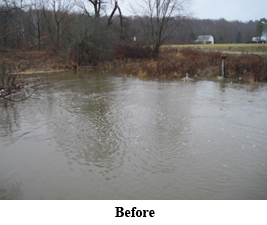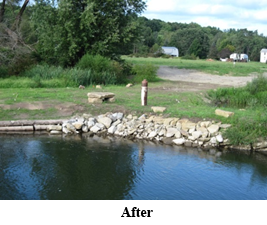Projects:
Muddy Run
Stream Enhancements Help Threatened Species
Wildlife For Everyone Foundation partners with U.S. Fish and Wildlife Services, PennDOT and Crawford County Conservation District for Athens Township project.
December 11, 2014 - Much-needed stream restoration on Muddy Run in Athens Township, Crawford County, PA, is providing improved habitats for several aquatic species, including one designated as threatened by Pennsylvania officials. Wildlife For Everyone Foundation managed funds for the project, which was coordinated by the U.S. Fish and Wildlife Service. The Pennsylvania Department of Transportation and Crawford County Conservation District also contributed.
 Experts worked to reestablish the natural stream channel and stabilize stream banks to decrease the influx of sedimentation to the stream. The project was initiated after a core boring to replace the bridge at Eddie Road resulted in groundwater related subsidence, which over-widened the stream channel and sunk the streambed to as deep as 19 feet in some areas. Crews constructed an extensive bankfull bench, mud sills and rubble vanes to correct mounting issues.
Experts worked to reestablish the natural stream channel and stabilize stream banks to decrease the influx of sedimentation to the stream. The project was initiated after a core boring to replace the bridge at Eddie Road resulted in groundwater related subsidence, which over-widened the stream channel and sunk the streambed to as deep as 19 feet in some areas. Crews constructed an extensive bankfull bench, mud sills and rubble vanes to correct mounting issues.
 The bankfull bench was constructed along the sunken river right bank and was stabilized with a 180-foot mudsill. Rubble vanes were installed upstream of this mudsill to gently guide the stream flow around the bend and along the mudsill. An additional 80-foot mudsill was constructed adjacent to the existing bank on river left, across from the lower end of the river right mudsill. These structures create an area of slower moving water adjacent to the banks and enhance habitat for fish and wildlife species.
The bankfull bench was constructed along the sunken river right bank and was stabilized with a 180-foot mudsill. Rubble vanes were installed upstream of this mudsill to gently guide the stream flow around the bend and along the mudsill. An additional 80-foot mudsill was constructed adjacent to the existing bank on river left, across from the lower end of the river right mudsill. These structures create an area of slower moving water adjacent to the banks and enhance habitat for fish and wildlife species.
Muddy Run provides significant habitat for several aquatic species. Some areas upstream of the project site are designated as Wild Trout Waters. The mountain brook lamprey (Ichthyomyzon greeleyi), a Pennsylvania state threatened species, occurs in this stream. Additionally, Muddy Run is inhabited by four federally listed, endangered mussel species, the northern riffleshell (Epioblasma torulosa rangiana), the clubshell (Pleurobema clava), the rayed bean (Villosa fabalis), and the snuffbox (Epioblasma triquetra).
This restoration project benefits these species, as well as others in the project area. Stabilization of the stream banks, reduction in erosion and sediment input to the stream and significant improvements to habitat provide a healthy stream channel with natural log and rock features. Work was completed in fall 2014.
